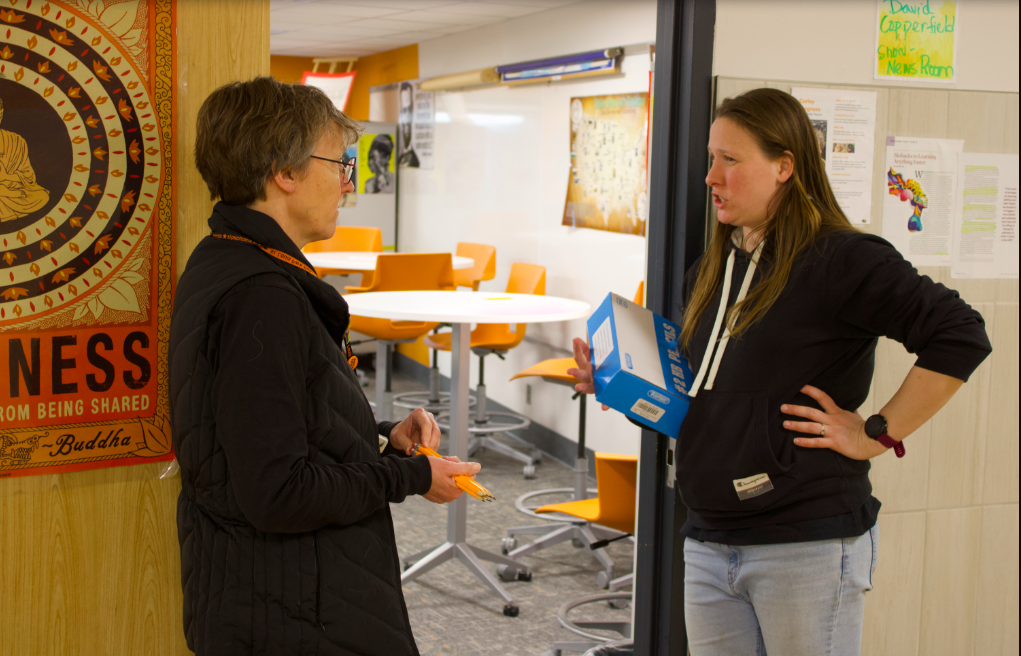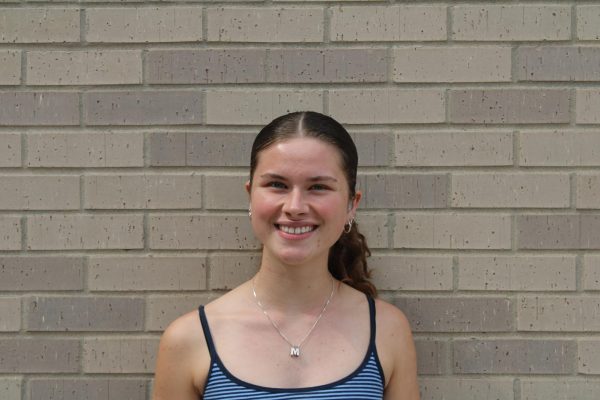As the 24-25 school year continues, students’ workload can start to pile up and create an imbalance in everyone’s lives. Students may decrease the amount of sleep they are getting each night because the amount of homework doesn’t permit a full night’s rest.
Senior Estella Hughes said when she gets less sleep, her in-class productivity decreases significantly. Hughes said she retains a lot less information when she is sleep-deprived.
“On the days where it’s really bad and I don’t get that much sleep, I’m trying to stay awake through all my classes. I definitely do worse in my classes as well,” Hughes said. “I put in the same amount of work, but I get a lot less back from it.”
According to Marvin Yan, a clinical psychology PhD student at the University of Minnesota, with a decrease in the amount of sleep comes a decrease in your cognitive function. Yan said if you are overly sleep-deprived it can even become dangerous.
“There is research out there that shows people with reduced amounts of sleep have far worse cognitive performance. A lot of the reaction times are slower too. When we’re thinking of taking certain tests that take time you’re slower at completing the questions and the task,” Yan said. “If you have a very extreme state of sleep deprivation, then there are other studies that have shown that you have a similar reaction time to people who have had some alcohol while driving.”
According to AP Psychology teacher Julia Germain, a student’s memory is impacted by the amount of sleep they get. Germain said by getting more sleep, in-class productivity can significantly increase.
“With the lack of sleep and constantly getting lack of sleep your working memory is gonna be impacted, so sleep actually plays a huge role in storing your memories and putting things into long-term memories,” Germain said. “When you’re not getting sleep, you’ll have trouble recalling a lot of things and overall we’ll just have a much harder time focusing on your work the next day, which will then decrease your productivity.”
According to freshman Clara Ekkers, she creates a routine for herself so she can be as productive as she possibly can be. Ekkers said she tries to stay off of her phone to boost productivity and get her schoolwork done in a timely manner.
“I make sure that I have at least two hours after I eat dinner and practice to do homework and everything I need to do for school,” Ekkers said. “It’s usually schoolwork (keeping me up at night). I try to stay away from my phone so I am more productive but schoolwork is almost always keeping me up.”
According to Yan, sleep hygiene is a crucial step towards a good night’s sleep. Yan said anything remotely mentally stimulating can keep someone awake, so students need to calm their bodies down for up to an hour before bedtime.
“We do want to practice sleep hygiene. These are behavioral strategies like putting your phone in a different room, or stop looking at screens 15, 30 minutes to an hour before bed,” Yan said. “If you’re doing homework, working on something, or doing anything that’s really exciting, whether that’s playing video games or watching a really intense show, just give yourself some time to decompress after that and slowly get into your tech-free bedtime routine.”
Germain said to get a full night’s rest, it’s important to create healthy habits that increase the amount of melatonin the brain produces. By creating these healthy habits, Germain said the brain will get into a “resting state” that will boost sleep.
“Trying to make sure you get a good amount of sleep, they recommend eight hours of sleep at night, (but) teenagers actually need more sleep than adults,” Germain said. “Also making sure that you’re turning off any sort of lights or staying off your phone right before bed, that extra light actually can impact your brain and the production of melatonin. It essentially is telling your brain that it’s not time to go to bed yet, so turning off any lights and getting into a resting state before bed is best.”
According to Hughes, if she is feeling overwhelmed by the amount of schoolwork that she has, she will take a break to reset. Hughes said taking breaks helps limit her stress levels and helps her to relax.
“If I’m feeling overwhelmed by homework, I sometimes will save it for the morning or to do it at school,” Hughes said. “Or if I know I’m not gonna get enough sleep, I might just give up on some of it. If I’m feeling stressed out, I’ll just take some time to relax, unwind, maybe watch a movie.”
According to Yan, sleep can play a crucial role in mental health. Yan said the amount of sleep someone receives is a large indicator to their mental health.
“Sleep affects mental health conditions because a lot of times it’s actually part of how we diagnose some of these conditions. So for example, depression,” Yan said. “One of the criteria that can be met for a diagnosis of depression is disrupted or abnormal sleep. That’s either not getting enough sleep, sleeping in too much or having disrupted sleep during the night.”
Germain said it will be more beneficial for high academic performance to get sleep rather than stay up late studying. Germain said that getting a full night’s rest will help productivity and memory the next day.
“My biggest piece of advice would be prioritizing sleep,” Germain said. “Even if you are cramming for a test or you have a lot of homework, it’s actually better for you to go to bed earlier and get more sleep at night. It actually will benefit you in the long run, just given your productivity the next day and help your working memory the next day.”
According to Ekkers, if she doesn’t get enough sleep each day, it will affect her entire life and not just her academic performance. Ekkers said she needs to get as much sleep as she can possibly get.
“I get less sleep, I’m tired throughout the day,” Ekkers said. “The lack of sleep can affect everything else in my life and my day. It’s important to get all possible hours of sleep you can, otherwise my entire day is affected.”
Yan said sleep is a quality, key resource to everyone that can be incredibly preventative. Yan said with the increase of sleep comes the increase of the quality of life as your energy will be heightened as well as your performance.
“One of the things that we always ask for in therapy is to see how people are sleeping. We see a lot of times when people make adjustments to their sleep they can have more energy and it can affect their mood. The same idea is implemented in your school performance,” Yan said. “Your brain will work at a much higher capacity if your sleep duration increases. I think everyone can benefit from sleep, whether you have mental health struggles, decreased academic performance or no problems at all. Sleep is something that’s good and preventative.”












